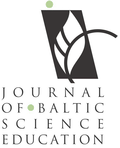CONCEPTUALIZING SPATIAL ABILITIES AND THEIR RELATION TO SCIENCE LEARNING FROM A COGNITIVE PERSPECTIVE
| Title | CONCEPTUALIZING SPATIAL ABILITIES AND THEIR RELATION TO SCIENCE LEARNING FROM A COGNITIVE PERSPECTIVE |
| Publication Type | Journal Article |
| Year of Publication | 2020 |
| Authors | Chen, Y-C, Yang, F-Y, Chang, C-C |
| Journal | Journal of Baltic Science Education |
| Volume | 19 |
| Issue | 1 |
| Start Page | 50-63 |
| Pagination | Continuous |
| Date Published | February/2020 |
| Type of Article | Original article |
| ISSN | 1648-3898 |
| Other Numbers | E-ISSN 2538-7138 |
| Keywords | domain knowledge, domain-generality, domain-specificity, educational intervention, science learning, spatial ability |
| Abstract | Science learning requires visuospatial thinking. Accordingly, spatial ability is regarded as the key to learning science well, but its effects are sometimes not as significant as expected. To this end, this research aims to conceptualize spatial abilities and to clarify their relation to science learning based on an analysis of empirical studies. Content analysis of 39 studies showed that (1) intrinsic-dynamic skills are the most frequently measured, (2) the explored science topics mostly involve well-established knowledge, (3) the effects of spatial ability on science achievement are inconsistent, and (4) educational interventions are not always effective in improving students’ spatial abilities or science achievement. It is argued that domain knowledge interferes with the study results and that domain-specific spatial ability exists, referring to apply spatial-type and domain-specific knowledge. Supported by cognitive theories and empirical evidence, a model is constructed to exhibit the relations between domain-general and domain-specific spatial ability as well as their effects on science achievement. According to the model, the two spatial abilities functionally partially overlap in the operations of spatial skills, and educational experience and malleable spatial skills are reciprocal; however, improvement in general spatial ability, involving the function of the central executive system, is likely limited. |
| URL | http://oaji.net/articles/2020/987-1581663740.pdf |
| DOI | 10.33225/jbse/20.19.50 |
| Refereed Designation | Refereed |
| Full Text |
